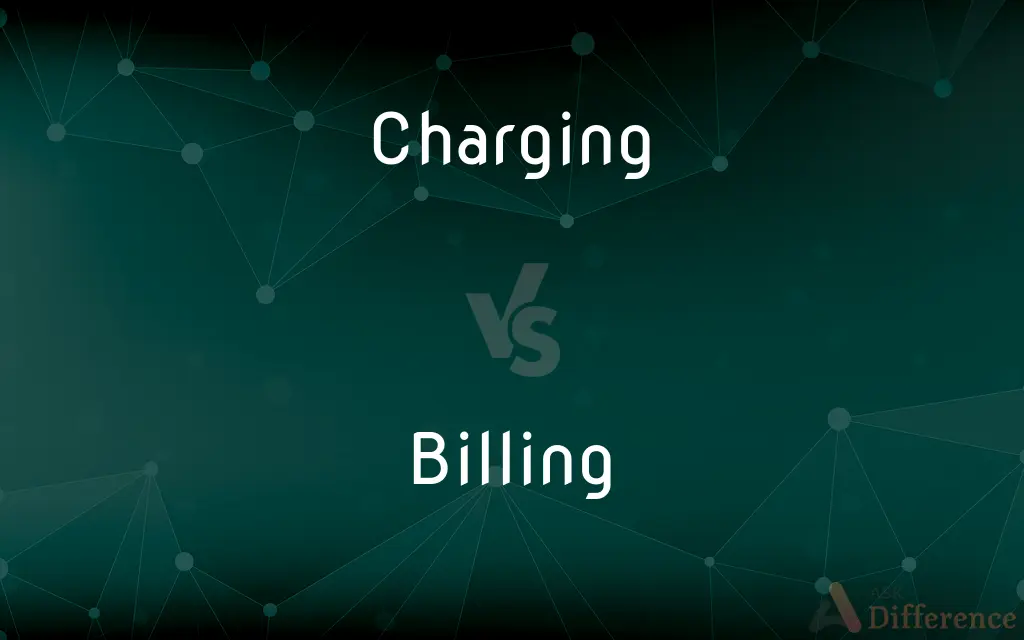Charging vs. Billing — What's the Difference?
By Maham Liaqat & Fiza Rafique — Updated on March 24, 2024
Charging is the process of applying a fee for services or goods used, while billing involves issuing invoices or statements for charges incurred.

Difference Between Charging and Billing
Table of Contents
ADVERTISEMENT
Key Differences
Charging refers to the act of imposing a fee on the consumption or use of services or goods, focusing on the transaction aspect. On the other hand, billing is the preparation and issuance of a detailed invoice or statement, listing the charges incurred, and often, it marks the beginning of the payment collection process.
While charging directly relates to the financial transaction between a service provider and the consumer, indicating the point at which costs are applied, billing encompasses a broader administrative process, including itemization of charges, calculation of total amounts due, and communication of payment expectations to the customer.
Charging often occurs at the time of service delivery or product purchase, making it a critical point of sale or service interaction, where the price for the service or product is determined and applied. Conversely, billing may happen immediately following the charging process or at a scheduled interval, serving as a formal notification of charges due and often providing a summary of the transaction or service period.
In many industries, charging is a dynamic process that can vary based on consumption levels, service durations, or contractual agreements, reflecting the variable costs associated with the provided goods or services. Billing, however, is typically a standardized process that follows organizational guidelines or regulatory requirements, aiming to present charges in a clear, understandable format for payment processing.
The methods and technologies used in charging can significantly influence the pricing strategy, such as real-time billing or usage-based pricing models, highlighting its role in financial management and customer experience. Billing, by contrast, emphasizes accuracy, compliance, and communication, focusing on ensuring that charges are properly documented, communicated, and reconciled with customer payments.
ADVERTISEMENT
Comparison Chart
Definition
Applying a fee for services or goods used.
Issuing invoices or statements for charges incurred.
Focus
Transaction and application of costs.
Administration, itemization, and communication of payment details.
Timing
At the time of service delivery or product purchase.
After charging, either immediately or at a scheduled interval.
Process Variability
Can vary based on consumption, service duration, or agreements.
Standardized, following organizational or regulatory guidelines.
Impact on Customer
Directly relates to the cost incurred by the customer for specific goods or services.
Informs the customer of the total charges due and initiates the payment collection process.
Key Functions
Determination and application of prices for services/products.
Compilation and communication of all charges due for payment.
Technologies Used
Real-time billing, usage-based pricing models.
Electronic billing systems, invoice generation software.
Objective
To establish the cost associated with consumption.
To formalize and communicate financial obligations to the customer.
Compare with Definitions
Charging
The act of applying a cost at the point of sale.
Charging for extra luggage at the airport is common among airlines.
Billing
Compilation of all charges for services or goods provided.
The event planner's billing included charges for venue, catering, and decorations.
Charging
The process involved in financial transactions for services rendered.
The mobile app charges a subscription fee for premium features.
Billing
Formal communication of financial obligations to a customer.
Patients receive billing statements from hospitals post-treatment.
Charging
Imposing a fee for the use of services or goods.
The cafe started charging for high-speed Wi-Fi access to encourage purchases.
Billing
Creating invoices or statements listing charges incurred.
The contractor sends monthly billing statements for ongoing work.
Charging
Setting a price for a product or service.
Online platforms charge sellers a fee for listing items for sale.
Billing
The process of notifying customers about payments due.
The gym's billing system automatically emails members their monthly dues.
Charging
Determining the price based on usage or consumption.
The utility company charges for electricity based on monthly usage.
Billing
Summarizing transaction or service period charges for payment.
Utility bills summarize monthly consumption and applicable charges.
Charging
To impose a duty, responsibility, or obligation on
Charged him with the task of watching the young swimmers.
Billing
The relative importance of performers as indicated by the position and type size in which their names are listed on programs, theater marquees, or advertisements
Top billing.
Charging
To instruct or urge authoritatively; command
Charged her not to reveal the source of information.
Billing
Advertising; promotion
The product needed better billing to outsell its competition.
Charging
(Law) To instruct (a jury) about the law, its application, and the weighing of evidence.
Billing
Often billings The total amount of business done in a specific period, as by an advertising agency or a law firm.
Charging
To set or ask (a given amount) as a price
Charges ten dollars for a haircut.
Billing
Present participle of bill
Charging
To hold financially liable; demand payment from
Charged her for the balance due.
Billing
Amounts billed.
Charging
To purchase on credit
Paid cash for the stockings but charged the new coat.
Billing
Accounts receivable.
Charging
To load to capacity; fill
Charge a furnace with coal.
Billing
The tracking of bills and amounts owed; the department within an institution or business that deals with the tracking of bills and amounts owed.
Charging
To load (a gun or other firearm) with a quantity of explosive
Charged the musket with powder.
Billing
The act or situation of including someone or something among those that make up a complete list.
Charging
To pervade or fill, as with a feeling or quality
The atmosphere was charged with tension.
Billing
Caressing; kissing.
Charging
To make a claim of wrongdoing against; accuse or blame
The prosecutors charged him with car theft. Critics charged the writer with a lack of originality.
Billing
Request for payment of a debt;
They submitted their charges at the end of each month
Charging
To put the blame for; attribute or impute
Charged the accident to the driver's inexperience.
Charging
To rush against in an attack
The troops charged the enemy line.
Charging
(Basketball) To bump or run into (a defender) illegally while in possession of the ball or having just made a pass or shot.
Charging
(Sports) To bump (an opponent) so as to knock off balance or gain control of the ball, as in soccer.
Charging
(Sports) To body-check (an opponent) illegally, from behind or after taking more than two strides, especially in ice hockey.
Charging
To cause formation of a net electric charge on or in (a conductor, for example).
Charging
To energize (a storage battery) by passing current through it in the direction opposite to discharge.
Charging
To excite; rouse
A speaker who knows how to charge up a crowd.
Charging
To direct or put (a weapon) into position for use; level or direct.
Charging
(Heraldry) To place a charge on (an escutcheon).
Charging
To rush forward in an attack
The dog charged at the intruder.
Charging
To rush forward; run
Children charging around the house.
Charging
To demand or ask payment
Did not charge for the second cup of coffee.
Charging
To make a purchase or purchases on credit.
Charging
(Accounting) To consider or record as a loss. Often used with off.
Charging
To become energized
The battery is still charging.
Charging
Expense; cost
Added to the bill a charge for replacing the thermostat.
Charging
The price asked for something
What's the charge for a new tire?.
Charging
A debt or an entry in an account recording a debt
Are you paying cash or is this a charge?.
Charging
A financial burden, such as a tax or lien.
Charging
A weight or burden; a load
A freighter relieved of its charge of cargo.
Charging
The quantity that a container or apparatus can hold.
Charging
A quantity of explosive to be set off at one time.
Charging
An assigned duty or task; a responsibility
The commission's charge was to determine the facts.
Charging
Care; custody
A child put in my charge.
Charging
Supervision; management
The scientist who had overall charge of the research project.
Charging
One that is entrusted to another's care or management
The baby sitter's three young charges.
Charging
An order, command, or injunction.
Charging
Instruction given by a judge to a jury about the law, its application, and the weighing of evidence.
Charging
A claim of wrongdoing; an accusation
A charge of murder.
Pleaded not guilty to the charges.
Charging
A rushing, forceful attack
Repelled the charge of enemy troops.
The charge of a herd of elephants.
Charging
The command to attack
The bugler sounded the charge.
Charging
The intrinsic property of matter responsible for all electric phenomena, in particular for the electromagnetic force, occurring in two forms arbitrarily designated negative and positive.
Charging
The net measure of this property possessed by a body or contained in a bounded region of space, measured in coulombs, ampere-hours, or units of elementary charge. Also called electric charge.
Charging
See magnetic charge.
Charging
See color charge.
Charging
(Informal) A feeling of pleasant excitement; a thrill
Got a real charge out of the movie.
Charging
(Heraldry) A figure or device represented on the field of an escutcheon.
Charging
Present participle of charge
Charging
(countable) An act or process of charging (as of a battery).
Charging
An offensive foul in which the player with the ball moves into a stationary defender.
Smith is called for charging, and the Nimrods will get the ball.
Common Curiosities
How do charging and billing relate to each other?
Charging is the initial step where costs are determined and applied, while billing follows as a detailed communication and itemization of those charges to the customer.
Can charging occur without a subsequent billing process?
In some cases, yes, especially in direct transactions where payment is immediate and does not require a formal billing statement.
What is charging?
Charging is the act of applying a fee for the consumption or use of services or goods, often occurring at the point of sale or service delivery.
What is billing?
Billing is the process of issuing detailed invoices or statements that list all charges incurred, often serving as a formal request for payment.
Why is accurate billing important?
Accurate billing is crucial for ensuring trust between the service provider and the customer, avoiding disputes, and facilitating timely payments.
What role does technology play in charging and billing?
Technology facilitates more accurate, efficient, and customizable charging and billing processes, improving customer experience and operational efficiency.
How do subscription services handle charging and billing?
Subscription services often charge a recurring fee, with billing statements issued regularly to reflect the ongoing service period and any additional charges.
How does the timing of charging and billing affect the payment process?
The timing can influence customer satisfaction and cash flow; immediate billing after charging can lead to quicker payments and reduced confusion.
How do businesses choose their charging and billing practices?
Businesses consider factors like industry standards, customer preferences, regulatory requirements, and operational efficiency in their decisions.
Is it possible to dispute a charge or billing statement?
Yes, customers can usually dispute charges they believe are incorrect or unjustified, leading to an investigation and potential adjustments.
How does billing impact customer satisfaction?
Clear, accurate billing positively impacts customer satisfaction by ensuring transparency and trust in the financial aspects of service or product delivery.
Can billing include charges not directly related to consumption?
Yes, billing can include additional fees or charges, such as service fees, taxes, or penalties, that are not directly tied to consumption levels.
What happens if there's a discrepancy in charging or billing?
Discrepancies typically trigger a review or audit process to resolve any errors and ensure the accurate reflection of charges and payments.
What are some common billing challenges?
Challenges include ensuring accuracy, managing varying billing cycles, integrating with payment systems, and maintaining compliance with regulations.
What is electronic billing?
Electronic billing is the digital issuance and payment of bills, enabling faster, more efficient processing and eco-friendly practices.
Share Your Discovery

Previous Comparison
Dandy vs. Good
Next Comparison
Acrania vs. CraniataAuthor Spotlight
Written by
Maham LiaqatCo-written by
Fiza RafiqueFiza Rafique is a skilled content writer at AskDifference.com, where she meticulously refines and enhances written pieces. Drawing from her vast editorial expertise, Fiza ensures clarity, accuracy, and precision in every article. Passionate about language, she continually seeks to elevate the quality of content for readers worldwide.
















































